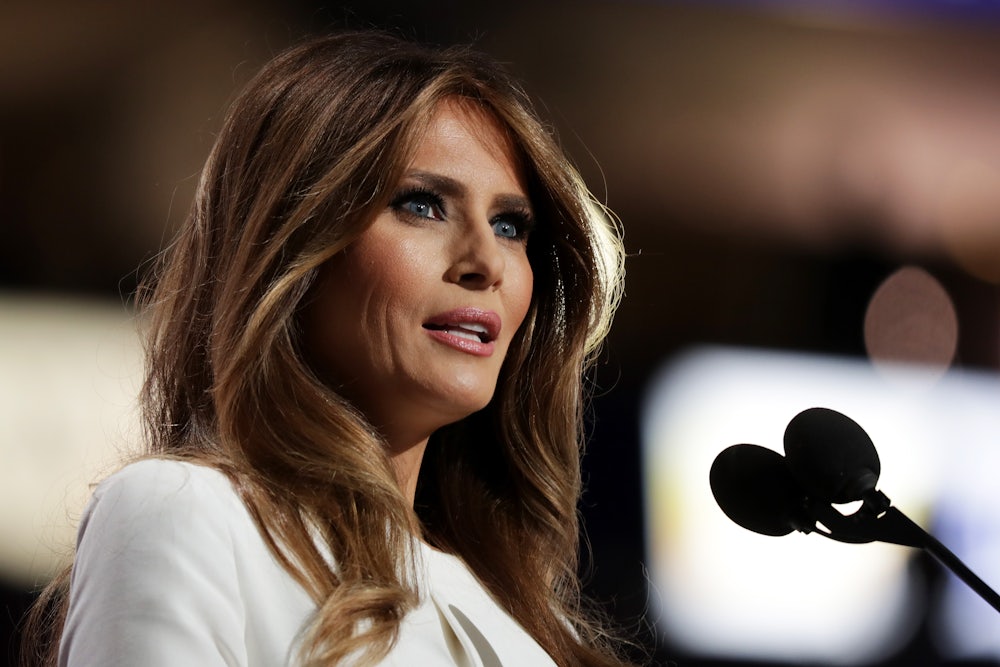On Monday night, she read six sentences that originally appeared—nearly verbatim—in Michelle Obama’s 2008 DNC address. Whether it was intentional or not—or whether Melania or a speechwriter is to blame—that portion of her speech was plagiarized, but not every outlet is reporting it that way. Instead, many are framing it as if it could have been merely coincidental. “Striking similarities” is, as Bryan Curtis pointed out on Twitter, the preferred euphemism for what Melania read. A brief rundown of headlines:
The New York Times: “Melania Trump’s Speech Bears Striking Similarities to Michelle Obama’s in 2008”
The Los Angeles Times: “Melania Trump’s RNC speech is strikingly similar to Michelle Obama’s 2008 convention speech”
Politico: “Melania Trump’s prime-time speech was strikingly similar to Michelle Obama’s”
The Guardian: “Melania Trump’s speech is strikingly similar to Michelle Obama’s 2008 address”
“Strikingly similar” wasn’t the only euphemism in play:
The Chicago Tribune: “Melania Trump speech similar to Michelle Obama’s in 2008; campaign says ‘no cribbing’”
NPR: “Section Of Melania Trump’s Monday Speech Mirrors Michelle Obama’s In 2008”
Bloomberg: Melania Trump Echoes Michelle Obama in Convention Speech
Reuters: “Melania Trump’s speech has an echo of Michelle Obama words”
The Wall Street Journal: “Melania Trump Speech Used Same Passages as Michelle Obama’s 2008 Address”
So why “striking similarities” and “echoes” and “mirrors”? These words do a lot of work to elbow their way into a middle-ground between reporting what happened in Cleveland accurately, lobbing an accusation at Melania Trump, and leaving room for further explanation. (The Chicago Tribune, for instance, includes the Trump campaign’s response, even though it’s clearly spin—and that’s putting it nicely.) Newspapers, of course, are supposed to remain objective and not take sides, and “strikingly similar” is there to preserve the sense of that objectivity, even if comes at the expense of accuracy. Trump’s campaign has, time and time again, used this defensiveness to its advantage—the mainstream press has to hear both sides, even if one of the sides is wrong and/or lying. But accusing Melania Trump of plagiarism would reek of editorializing, whereas “strikingly similar” has enough cracks to allow Trump’s team room to offer a counter-narrative. Similarly, by avoiding blaming Melania, the press is leaving room for someone else—a speechwriter—to take the blame.
Finally, there’s the press’s obvious unease about confronting Melania Trump too forcefully. Trump is a non-politician with little public speaking experience, but more than that, she’s a potential First Lady, and American First Ladies occupy an unusual role in American political life. Their positions are simultaneously political and apolitical, and per journalistic norms, they tend not to deserve the scrutiny their partners receive as a matter of course. (Melania’s now-controversial speech—a bland homily in an extraordinarily political setting—is itself a testament to First Ladies’ ambiguous position.) That Trump plagiarized her speech from the second-most scrutinized First Lady in presidential history is yet another irony of this scandal. The most scrutinized First Lady in history? Her husband’s opponent, Hillary Clinton.
